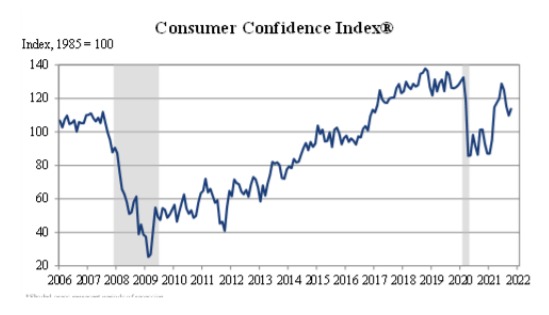Consumer Confidence Increases after Falling for Three Months in a Row
On Tuesday, October 26th, the Conference Board reported that its Consumer Confidence Index increased in October, after falling for the previous three months.
- The Index now stands at 113.8 (1985=100), up from 109.8 in September.
- The Present Situation Index – based on consumers’ assessment of current business and
labor market conditions – rose to 147.4 from 144.3 last month.
- The Expectations Index – based on consumers’ short-term outlook for income, business, and labor market conditions – improved to 91.3 from 86.7
“Consumer confidence improved in October, reversing a three-month downward trend as concerns about the spread of the Delta variant eased. While short-term inflation concerns rose to a 13-year high, the impact on confidence was muted.
The proportion of consumers planning to purchase homes, automobiles, and major appliances all increased in October – a sign that consumer spending will continue to support economic growth through the final months of 2021. Likewise, nearly half of respondents (47.6%) said they intend to take a vacation within the next six months – the highest level since February 2020, a reflection of the ongoing resurgence in consumers’ willingness to travel and spend on in-person services.”

Present Situation
“Consumers’ appraisal of current business conditions was mixed in October.
- 18.6% of consumers said business conditions are “good,” down from 19.1%
- On the other hand, 24.9% of consumers said business conditions are “bad,” down from 25.3%.
Expectations Six Months Hence
Consumers’ optimism about the short-term business conditions outlook was mixed in October.
- 24.3% of consumers expect business conditions will improve, up from 21.7%.
- On the other hand, 21.1% expect business conditions to worsen, up from 17.6%.
Consumers were more optimistic about the short-term labor market outlook.
- 25.4% of consumers expect more jobs to be available in the months ahead, up from 21.3%.
- 18.3% anticipate fewer jobs, down from 19.9%.
Consumers were more positive about their shortterm financial prospects.
- 18.7% of consumers expect their incomes to increase, up from 16.9%.
- 11.3% expect their incomes will decrease, virtually unchanged from 11.4%.”
More Data Later in the Week
More economic data will be released later this week, including Durable Goods Orders on Wednesday; GDP and Pending Homes Sales Index on Thursday and Chicago PMI on Friday.




